|
|
|
|
High-level Dialogue on Financing for Development, 27-28 June 2005 |
|
|
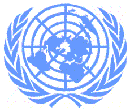 |
|
|
|
|
|
|
|
|
|
|
|
|
|
|
| Tuesday, 28 June
Web archives for Monday, 27 June
On Tuesday, six interactive multi-stakeholder round tables were held in the morning, with each round table focusing on a different chapter of the Monterrey Consensus. This was followed in the afternoon by an informal interactive dialogue with the participation of relevant stakeholders, including representatives of intergovernmental organizations, civil society and the private sector. The two-day event was designed not only to support the implementation of the Monterrey Consensus, but also to contribute to the High-level Plenary Meeting of the UN General Assembly in September 2005 (also known as the “2005 World Summit”) – a major event intended to review the outcomes of the Millennium Summit in 2000. |
| |
|
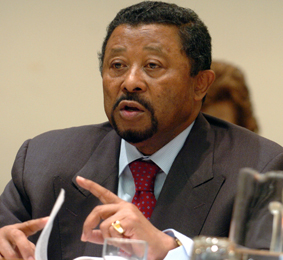 |
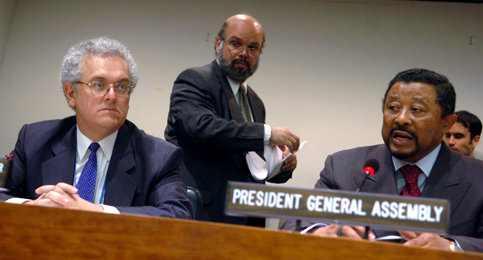 |
| |
|
Jean Ping, GA President (left) and with
José Antonio Ocampo, Under-Secretary General for Economic and Social Affairs (right)
During his closing statement, GA President Jean Ping, summarized some of the key issues raised during the dialogue, noting a focus on: enhancing efforts to achieve the MDGs especially in Africa; building national ownership of development strategies; developing the private sector and linking it to poverty reduction; carrying forward the work of the Doha Round; increasing ODA; improving aid effectiveness; making progress in innovative financing mechanisms; creating an international financial facility, developing a regional approach to financing; extending debt elimination to non-HIPC countries; considering debt sustainability measures; improving cooperation between the UN, World Bank and the WTO; improving coherence between trade and aid policies; strengthening the participation of developing countries in the international financial dialogue, and reforming the ECOSOC and other UN bodies.
|
| |
|
Roundtables
On Tuesday morning, delegates convened in six separate round table meetings to discuss various aspects of financing for development, including: mobilizing domestic financial resources for development; mobilizing international resources for development – foreign direct investment and other private flows; international trade as an engine for development; increasing international financial and technical cooperation for development; external debt; and addressing systemic issues – enhancing the coherence and consistency of the international monetary, financial and trading systems in support of development. Participants included ministers and other high-level representatives of governments, international organizations, civil society and the private sector. The round tables involved discussions rather than presentations. |
| Roundtable on Mobilizing international resources for development: foreign direct investment and other private flows: Co-chairs Datuk Mustapa Mohamed, Minister in the Prime Minister Department, Malaysia (left) and Baledzi Gaolathe, Minsiter of Finance and Development Planning, Botswana |
|
|
|
| Kim Hak-Su, Executive Secretary, UN Economic and Social Commission for Asia and the Pacific (ESCAP) |
| |
|
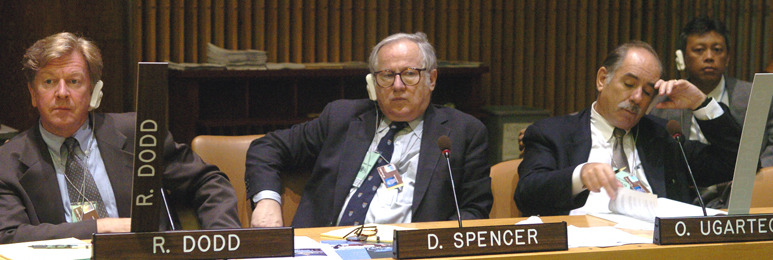
|
| |
|
| Civil society represenatatives during the roundtable |
|
| |
|
|
| Civil society representative Steve Canner, US Council for International Business (left) |
| Roundtable on Mobilizing domestic financial resources for development: John Wasielewski, USAID Bureau for Economic Growth Agriculture and Trade, US (left) speaking with delegates after the roundtable adjourns |
|
| Roundtable on Addressing systemic issues: enhancing the coherence and consistency of the international monetary, financial and trading systems in support of development: Co-chairs Hilde Johnson, Minister of International Development of Norway (left) and Ana Hrastovic, Vice-Minister of Finance, Croatia |
|
| Roundtable on External Debt |
| |
|
| |
|
|
Co-chairs Frans Godts, Belgium, and Errol Cort, Minister of Finance and Economy of Antigua and Barbuda
|
|
| Roundtable on Increasing intenrational financial and technical cooperation for development: Co-chairs Aun Porn Moniroth, Secretary of State, Ministry of Economy and Finance, Cambodia, and Jean-Louis Schiltz, Minister for Development Cooperation and Humanitarian Action, Luxembourg |
| The OECD represenatative (left) and Louis Michel, European Commisssion (right) |
| |
|
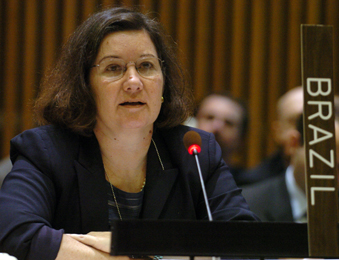 |
|
| |
| Maria Luiza Ribeiro Viotti, Brazil (left) |
| |
|
| Miscellaneous photos from the roundtables |
| |
Zhang Yishan, China, said a monitoring mechanism was needed to ensure timely delivery of high quality ODA, noted progress in developing countries on domestic reforms, and expressed concerns at heavy conditionalities on assistance.
Alounkeo Kittikhoun, Laos, on behalf of the Landlocked Developing Countries, Laos, speaking for Landlocked Developing Countries, said these countries needed increased ODA, and expressed concern at the imposition of too many conditionalities.
|
Mihnea Motoc, Romania (left), noted its gradual transition from being a donor recipient to an emerging donor.
Heraldo Munoz, Chile (right), said increased ODA and new sources of funding should not imply new institutions, but strengthening existing ones, and supported consistent policies, good governance, and an early conclusion to the Doha Round.
|
|
| Informal interactive dialogue |
| |
Carlin Jamtin, Minister for International Development Cooperation, Sweden, urged developing countries to work on governance, anti-corruption and democracy and proposed addition of the lack of employment and reproductive health rights to the seven concerns listed in the opening of the session.
José Antonio Ocampo, UN Under-Secretary General for Economic and Social Affairs (center), identified seven key topics from the previous weeks' civil society hearings as: mobilization of domestic services; trade as an essential ingredient for development; more effective ODA; more stable sources of private financing; adoption of a debt sustainability definition; increase in South-South cooperation; and strengthening developing country participation in international institutions. |
| |
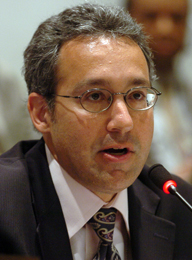 |
|
|
Richard Samans, Global Institute for Partnership and Governance, highlighted the importance of involving the private sector in development activities over increasing ODA, and proposed that development banks could encourage private investment by risk sharing.
Shrinivas G. Shyadambi , Reliance Industries, illustrated a public private partnership initiative to combat HIV/ AIDS and TB in Gujarat, India.
Julius Okara, Kenya Private Sector Alliance (KEPSA), spoke on the importance of investment in Africa. |
Jo Marie Griesgraber, New Rules for Global Finance, reported on the multi-stakeholder dialogue on systemic issues.
Brigitte Schmögnerova, Executive Secretary, UN Economic Commission for Europe, speaking for the Regional Commissions,
asserted the need to provide support for making development sustainable in such countries.
John Langmore, World Council of Churches, highlighted the need to make UN the central actor in international economic discussions. |
Henri Raubenheimer, Department of Foreign Affairs, South Africa, identified the need to balance development and peace and security issues to use the September meeting as an opportunity to advance the Monterrey Consensus.
Fayza Aboulnaga, Minister of International Cooperation, Egypt,
asserted the need for knowledge and technology transfer to enable middle income countries expand to new economic areas. |
| US Ambassador Sichan Siv with GA President Jean Ping |
|
|
|
|
|
|
|
|
|
|
|
|
|
|
|